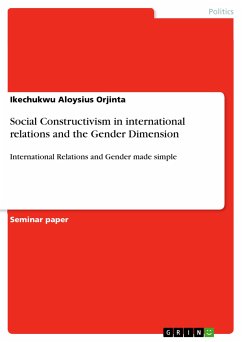Essay from the year 2004 in the subject Politics - Political Theory and the History of Ideas Journal, grade: 2, University of Nottingham (School of politics), course: Power and Leadership, language: English, abstract: This essay attempts to evaluate the State’s importance within the field of Politics. In the first place it needs to be discussed, what the State is. This is one of the most frequently asked questions within the field of Politics. It seems to be a simple question to ask but as we will see later on, the idea of the State is hard to pin down and there is not only one absolute definition. Often, the term ‘State’ is misunderstood and even misused. When mentioning the State there is a variety of responses: fear, hope or even puzzlement. We do not only talk of the ‘police state’ or the ‘welfare state’. It is undeniable that the State is of profound significance. In most advanced societies, the State has become a consistent presence – affecting our daily lives constantly. This is partly because the State is recording births, certifying them, authorizing our marriages and enacting them. We are paying taxes, carry our passport with us when entering or leaving a State and we have to obey the laws made by the State. Just try not to pay taxes. The State doesn’t reveal itself at the first look. By definition it’s an abstract idea, since it is independent of rulers who can be replaced. Several persons might argue that the today’s understanding of the term State is equivalent or a simple analogue of the Greek city (polis1). That is, the Greek polis had no understanding of privacy or citizens´ rights or freedoms. The polis stood above all and the citizens had to serve the polis not the way around, as we know it today. The State’s purpose today is to serve its citizens. But they do have something in common: They both have a definite territory, the idea of citizenship, a certain population and also laws. The State and its nature have been analyzed by various scholars in the twentieth century. 1` Transliteration of the Greek word for `city-state´. In Plato and especially Aristotle, polis has the normative connotation of the best form of social organization.´(McLean, I; McMillan A. (2003) Concise Dictionary of Politics, Polis p.413, Oxford University Press
Bitte wählen Sie Ihr Anliegen aus.
Rechnungen
Retourenschein anfordern
Bestellstatus
Storno









